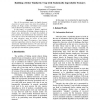Free Online Productivity Tools
i2Speak
i2Symbol
i2OCR
iTex2Img
iWeb2Print
iWeb2Shot
i2Type
iPdf2Split
iPdf2Merge
i2Bopomofo
i2Arabic
i2Style
i2Image
i2PDF
iLatex2Rtf
Sci2ools
HICSS
2009
IEEE
2009
IEEE
Building a Better Similarity Trap with Statistically Improbable Features
One of the persistent topics in digital forensic research in recent years has been the problem of finding all things similar. Developed tools usually take on the form of similarity, or fuzzy hash. In this paper, we present a generic empirical study of the problem of finding common features in binary data. Specifically, we study the problem of false positives and demonstrate that similarity tools work only as well as the underlying data allows them to and, therefore, must be aware of the basic properties of the input. We propose a new feature selection algorithm, which is based on the notion of statistically improbable features. We also show that the proposed method, can be tuned to account for the type-specific distribution of false positives.
Biometrics | Digital Forensic Research | False Positives | Generic Empirical Study | HICSS 2009 | System Sciences |
| Added | 19 May 2010 |
| Updated | 19 May 2010 |
| Type | Conference |
| Year | 2009 |
| Where | HICSS |
| Authors | Vassil Roussev |
Comments (0)

